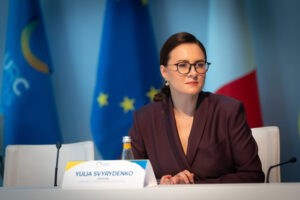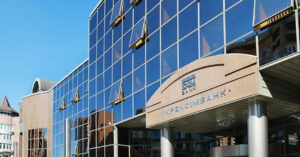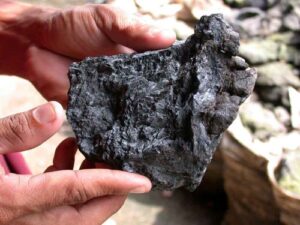
In January-August of this year, Ukraine reduced exports of titanium-containing ores and concentrates in physical terms by 94.2% compared to the same period last year, to 277 tons.
According to statistics released by the State Customs Service (SCS), in monetary terms, exports of titanium-bearing ores and concentrate decreased by 93.7% to $496,000.
The main exports were to Uzbekistan (35.61% of shipments in monetary terms), Turkey (35.01%), and Egypt (29.38%).
In addition, Ukraine imported 24 tons of titanium-containing ore worth $39,000 from China (94.87%, deliveries took place in January) and Uzbekistan (5.13%, deliveries took place in May) in the first eight months of 2025.
In the first eight months of 2025, Ukraine exported 2,466 tons of niobium, tantalum, vanadium, and zirconium ores and concentrates worth $3.954 million to Spain (48.90%), Germany (24.53%), and Italy (17.19%). At the same time, the country imported 321 tons of such ores worth $841 thousand from Spain (68.05%), China (15.8%), and the Czech Republic (13.06%).
As reported, in 2024, Ukraine reduced its exports of titanium-containing ores in physical terms by 37.5% compared to the previous year, to 7,284 thousand tons. In monetary terms, exports of titanium-containing ores and concentrates decreased by 40% to $11.654 million. The main exports were to Turkey (62.82% of supplies in monetary terms), Egypt (7.38%), and Poland (6.93%).
Last year, Ukraine imported 314 tons of titanium-containing ore worth $492 thousand from China (87.78%), Vietnam (6.11%), and Senegal (also 6.11%).
At the same time, experts pointed out the inconsistency of statistics on exports of titanium-containing ores. However, in response to a request from Interfax-Ukraine, the State Customs Service (SFS) of Ukraine stated that complete data on the export of titanium raw materials is not provided due to restrictions on the volume of export and import operations with military and dual-use goods, which are reflected in aggregate form under “Other goods.”
They explained that, in particular, deliveries of titanium-containing ores from companies differ from the SCS data.
“We would like to inform you that these deliveries are included in the statistical exports from Ukraine, but are not reflected in the foreign trade statistics published by the State Customs Service (…) under commodity item UKTZED 2614 ”Titanium ores and concentrates” in view of the following (…) In accordance with the regulations (…), when protecting data for confidentiality purposes, any information considered confidential is reported in full at the next, higher level of product data aggregation,” the State Customs Service explained in its response to the agency.
It was clarified that information on customs clearance and movement across the customs border of Ukraine of goods subject to export control is included in the list of information containing official information in the SSU, in accordance with the relevant order.
In Ukraine, titanium-containing ores are currently mined mainly by PJSC “United Mining and Chemical Company” (UMCC), which manages the Vilnohirsk Mining and Metallurgical Plant (VGMK, Dnipropetrovsk region) and the Irshansk Mining and Processing Plant (IGZK, Zhytomyr region), as well as LLC “Mezhirichensky GZK” and LLC “Valky-Ilmenite” (both LLCs are located in Irshansk, Zhytomyr region). In addition, the production and commercial firm Velta (Dnipro) built a mining and processing plant at the Birzulivskyi deposit with a capacity of 240,000 tons of ilmenite concentrate per year.

Ukraine will need at least $120 billion next year if the war unleashed by Russia continues, in order to hold the front line and minimize the number of lives lost among its defenders, Ukrainian Defense Minister Denys Shmyhal reiterated his July assessment at the annual YES conference “How to End the War,” organized by the Pinchuk Foundation in Kyiv on September 12-13.
“If the war ends, we will need a slightly smaller amount to simply keep our army in good shape in case of secondary aggression from the Russian side,” Shmyhal said.
“The economics of war show that if we spend less money than Russia, then we start paying with our territories and, most importantly, with our lives. Therefore, we need to attract all the necessary resources, all the necessary money,” he stressed.
The defense minister acknowledged that after three and a half years, many taxpayers are exhausted from spending such a huge amount of money, so he spoke in favor of using frozen Russian assets until Russia compensates for all the expenses that Ukraine and all countries have incurred during this wartime.
In his opinion, such a solution can be found even without direct confiscation, because the legal complexity of this procedure is understandable.
“We need to have a stable source of funding to finance Ukraine’s defense and reconstruction. Therefore, the number one issue for all of us is to find a political and legal solution for the use of frozen Russian assets,” Shmygal said.
He highlighted three main priorities: supplying the Defense Forces with more FPV drones, more robotic systems, and artillery shells, including long-range ones; sky defense—both with Patriots against ballistic missiles and with interceptor drones against drones; long-range weapons—Ukrainian-made drones and missiles.
“If our Western partners provide us with more deep strike systems and equipment, we will be absolutely delighted. But we can produce our own deep strike weapons, and again, we need funding,” the defense minister said.
He explained that such long-range strikes put the most pressure on the Russian economy and society, as well as directly on Putin, because they allow for the destruction of their oil refineries and military production infrastructure.
“We need to produce more, we need to continue carpet bombing operations, when all the planes in the Moscow region are grounded day after day. This is very inconvenient for the Moscow elite, and they are directly telling Putin: let’s stop this war because we can’t fly,” Shmygal added.
According to him, he conveys these needs during meetings in the Rammstein format.
In addition, the defense minister announced the need to create a so-called Kill Zone, which is currently being formed on the front line, to prevent aggression from recurring in the future. “These are lines of drones covering 10, 15, or even 30 km of territory,” he explained.
According to estimates by Alexander Parashchiy, head of the analytical department at investment company Concorde Capital, defense and security spending in 2024 amounted to approximately $95 billion, while this year he predicted it would grow to approximately $100-105 billion. Approximately half of this amount comes from the budget, while the other half has been provided by partners until recently.
In addition, Ukraine attracts about $40 billion in external financial assistance annually for non-military purposes in order to be able to finance military needs from the budget. For next year, Finance Minister Serhiy Marchenko has estimated the need for external financing of the state budget deficit at $45 billion, of which EUR16 billion has not yet been secured.
CONFERENCE, SHMYHAL, WAR, ЄС

Due to the protracted war, Ukraine will need more external funding next year than this year to cover the state budget deficit. Currently, the uncovered funding gap for next year amounts to €16 billion, according to Finance Minister Serhiy Marchenko.
“We need more money than this year. This year there was more (than last year). We have not yet seen the final stage of this war, so we need to prepare. I need to cover €16 billion for next year,“ he said at the 20th annual YES conference ”How to End the War,” organized by the Pinchuk Foundation in Kyiv on September 12-13.
Marchenko added that calculations are still ongoing and Ukraine hopes to find common ground with its partners on financing next year, as this is a key issue.
Regarding the initiative for a reparations loan to Ukraine secured by frozen Russian assets, which was announced this week by European Commission President Ursula von der Leyen, the minister noted that his European colleagues are very creative.
“They are capable of preparing various mechanisms that help us use frozen (Russian) assets without actual confiscation,” Marchenko believes.
He welcomed these efforts but clarified that the debate on the specific mechanism is still ongoing and he does not intend to spoil it.
As reported, on August 18, Ukrainian Finance Minister Serhiy Marchenko estimated the financial gap for 2026-2027, which is currently not covered by confirmed sources of funding, at $37 billion.
According to him, the external financing required for 2026 amounts to $45 billion, but it will be partially covered by the accumulated reserves from international financing received this year.

Moldova’s Ministry of Energy has prepared an energy strategy for the period up to 2050, which envisages a twofold reduction in electricity imports and a multiple increase in local generation, according to the country’s Minister of Energy, Dorin Jungiatu.
“We are striving to ensure that by 2050, more than 80% of electricity is produced locally from renewable sources (currently about 30%). The strategy envisages new connections with Romania and the European Union, an exchange capacity of 2,000 MW, and the availability of gas and electricity reserves,” he said at the presentation of the strategy. He is quoted by the state agency Moldpres.
According to Jungi, the modernization of the heating systems in Chisinau and Balti will be a priority. The authorities also propose to support the most vulnerable citizens with compensation, develop infrastructure for electric vehicles, launch electrified trains, and install 100,000 “smart” meters in households across the country by 2027.
According to mold-street.com, the cost of the measures planned in the strategy exceeds €41 billion, or more than €1.5 billion per year for the period of its implementation. The bulk of the investment—€17.5 billion—will be needed to transition from hydrocarbons to renewable and alternative energy sources, as well as to expand and modernize the electricity transmission system. More than €9 billion is planned to be allocated to the reconstruction and renovation of buildings and other energy efficiency measures. Another €8.5 billion is earmarked for increasing the capacity of electricity sources.
Overall, the strategy envisages reducing the share of energy imports in the energy balance from 77% to 40% in 2050 by reducing hydrocarbon consumption and completely phasing out coal by 2030.
It is planned that by 2050, Moldova’s own generation capacity will exceed 5,000 MW, doubling the current energy sources (including the Moldovan GRES in Transnistria). There are also plans to increase the capacity of wind farms 12-fold, to 2,600 MW.
At the same time, the authors of the strategy do not rule out the construction of a small modular reactor with a capacity of 300 MW in Moldova by 2050.

The European Bank for Reconstruction and Development (EBRD) will provide a risk-sharing guarantee without pre-financing to the state-owned Ukreximbank in order to expand financing and provide new loans to Ukrainian businesses in the amount of EUR100 million.
As stated on the EBRD website, whose board of directors approved the relevant project on September 9, it will cover up to 50% of the credit risk.
According to the published information, the guarantee will be provided in two equal tranches, with the second tranche currently without obligations.
It is noted that up to EUR 20 million of sub-loans with risk sharing will be directed to finance long-term investments by SMEs under the EU4Business-EBRD Credit Line with incentives, which will allow financing long-term capital investments by SMEs to upgrade their technologies and equipment to EU standards, including investments in sustainable and green technologies (at least 70% of the sub-limit).
Eligible sub-borrowers will also receive EU-funded technical assistance and grant support in the form of investment incentives upon completion of their investment projects.
Ukreximbank is the third largest bank in Ukraine in terms of total assets as of mid-year – UAH 318.6 billion (8.3% of the system’s total assets).

In January-August of this year, Ukraine reduced manganese ore exports by 82.2% compared to the same period last year, to 8,014 thousand tons, but in August, it stepped up deliveries.
According to statistics released by the State Customs Service (SCS), while deliveries in the first seven months of 2025 amounted to 2,977 thousand tons, exports more than doubled in August, when 5,037 thousand tons were exported.
In monetary terms, exports for the first eight months of 2025 fell by 79.8% compared to the same period in 2024, to $1.329 million.
The main exports were to Slovakia (97.89% of shipments in monetary terms) and Poland (2.11%).
There were no imports of manganese ore during this period.
As reported, in January 2024, Ukraine exported 44,903 thousand tons of manganese ore worth $6.563 million to the US, breaking a two-year absence of supplies to foreign markets. In February-December 2024, there were no exports of manganese ore.
At the same time, for the whole of 2024, the country imported 84,293 thousand tons worth $18.302 million from Ghana (98.85%), Brazil (0.99%), and Belgium (0.11%). There were no imports in October-November.
Ukraine did not export manganese ore in 2022 and 2023, and in 2021 it exported 770 tons worth $89 thousand.
In addition, it was reported that the Pokrovsky Mining and Processing Plant (PGZK, formerly Ordzhonikidze Mining and Processing Plant) and the Marganetsky Mining and Processing Plant (MGZK, both in Dnipropetrovsk region), which are part of the Privat Group, stopped mining and processing raw manganese ore in late October-early November 2023, while NZF and ZZF stopped smelting ferroalloys. In the summer of 2024, ferroalloy plants resumed production at a minimum level.
PGZK and MGZK did not produce any products in 2024, while in 2023, PGZK produced 160.31 thousand tons of manganese concentrate, and MGZK was idle.
In Ukraine, manganese ore is mined and enriched by the Pokrovsky and Marganets mining and enrichment plants.
The consumers of manganese ore are ferroalloy enterprises.